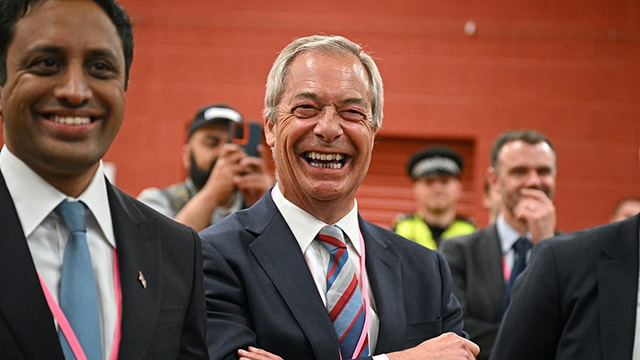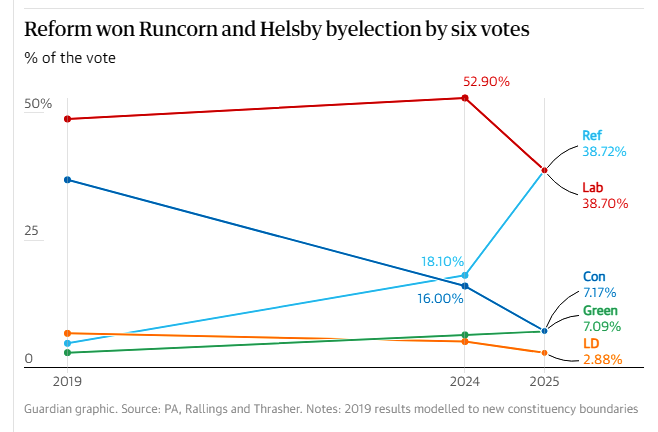 Nigel Farage maybe a next British PM.
Nigel Farage maybe a next British PM.
Photo: The Ddaily Mail
One Labour MP said: “It’s all very well for No 10 to say we’ve got to keep delivering. The problem is that it’s the stuff we’ve delivered that people hate.”
Nigel Farage has claimed that Reform UK has overtaken the Conservatives as the main party of opposition after his party narrowly won a byelection, a mayoralty and about two dozen council seats in early results on Friday, ‘The Guardian’ writes.
The Reform leader said the results from Runcorn and Helsby, Greater Lincolnshire and a handful of local elections around England showed his party should now be taken seriously as a prospective party of government.
As initial council results showed Labour losing seats, Keir Starmer said he understood voters’ disillusionment but that the answer was to “go further and faster” on what the government had already done.
Farage, speaking to reporters in Runcorn, where the party won with a majority of just six votes, said: “We’ve dug very deep into the Labour vote and, in other parts of England, we’ve dug deep into the Conservative vote. After tonight, there’s no question, in most of the country we are now the main opposition party to this government.”
Reform won in Runcorn and Helsby with a 17-point swing away from Labour, overturning a majority of more than 14,000. The Conservatives slumped from 16% of the vote at last year’s general election to 7% in this contest, narrowly finishing ahead of the Green party in third place.

Meanwhile, Andrea Jenkyns, the former Conservative MP, won the newly created Greater Lincolnshire mayoralty with a majority of 44,000 votes.
In a victory speech punctuated by angry attacks on her opponents, Jenkyns said: “I take my hat off to our leader, Farage. I know one day he will make a great prime minister.”
By 1pm on Friday, Reform had won 23 council seats – while Labour had lost 10 and the Conservatives seven – and took control of Staffordshire council, formerly held by the Tories. Labour did manage to hang on in three closely watched mayoral contests, however, winning in Doncaster, North Tyneside and the West of England.
The results have bolstered findings from national polls, which put Reform ahead of Labour and the Conservatives, with support increasingly atomised between the five main UK-wide parties.
John Curtice, the polling expert and professor of politics at the University of Strathclyde, told the BBC: “We’ve never previously had a situation where, even at an interim stage, we’ve got a party other than Conservative or Labour not just with more votes, but with more [council] seats than anybody else.”
Starmer, speaking to reporters during a visit to a defence factory in Luton, said: “What I want to say is, my response is, we get it. We were elected in last year to bring about change… I am determined that we will go further and faster on the change that people want to see.”
In Doncaster, the re-elected Labour mayor, Ros Jones, also highlighted cuts to the winter fuel allowance as stoking voters’ anger, as well as reductions in disability payments and a rise in national insurance.
Asked whether Starmer was listening to her voters, Jones said: “I would say no. They haven’t actually realised, because the people of Doncaster know how hard life can be, and it’s about delivering for them.”
One Labour MP said: “It’s all very well for No 10 to say we’ve got to keep delivering. The problem is that it’s the stuff we’ve delivered that people hate.”
read more in our Telegram-channel https://t.me/The_International_Affairs

 10:57 05.05.2025 •
10:57 05.05.2025 •






















